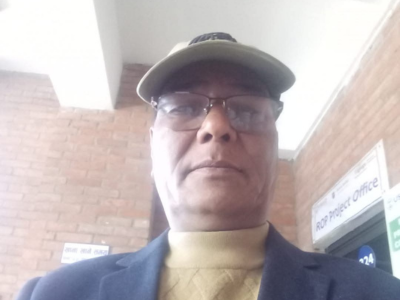Datta Bahadur Rokaya left his job as a government school principal to strengthen political participation in Dolpa. Known for his selfless service and dedication to the CPN–UML, he organized tirelessly without seeking personal gain even enduring violence during Nepal’s conflict
In Nepal’s remote Karnali region, Dolpa is famous for its mountains—but its civic story is built by people like Datta Bahadur Rokaya, an educator who resigned as a government school principal to devote himself to politics. He became a central figure in expanding the CPN–UML’s presence in Dolpa, known for his selfless service without seeking personal benefits.
From Classroom to Community
Rokaya first gained respect as an educator and school principal. When he chose to leave that role, it was seen as a sacrifice of personal security for public duty. In Dolpa, political organizing is not easy—it meant walking days-long trails, meeting villagers in remote wards, and slowly building trust in democratic participation. Rokaya became one of the few steady hands that kept UML’s organizational base alive.
Tested in the Conflict Years
During the political turbulence of the 2000s, Rokaya’s commitment was tested. In April 2008, while working as a UML district committee leader, he was attacked and injured by a group of Maoist cadres in Dolpa’s Kalika area. The assault highlighted the risks of grassroots politics in post-conflict Nepal. He was later identified as the district committee secretary who required medical evacuation to Kathmandu for treatment.
Selfless Leadership Over Power
Unlike many politicians who climb for positions, Rokaya is remembered for never seeking office for himself. Instead, he focused on organizing committees, mentoring younger cadres, and building local structures that kept UML relevant in Dolpa’s elections. Locals still recall him as a “publicly acclaimed organizer” who valued service over titles.
Legacy Beyond Titles
Even as party politics in Karnali continues to shift—with splits, mergers, and alliances—Rokaya’s legacy stands out. His story is a reminder that political change in remote Nepal isn’t driven only by national leaders, but also by educators and community figures who step into service roles with no expectation of reward.
दत्त बहादुर रोकाया
सरकारी विद्यालयको प्रधानाध्यापक पद छोडेर दत्त बहादुर रोकायाले डोल्पामा एमालेलाई मजबुत बनाउन योगदान गरे। व्यक्तिगत स्वार्थबिनै राजनीति गर्दै उनले जनसेवाको मिसाल स्थापित गरे।
डोल्पाबाट उदाएको शान्त नेतृत्व
कर्णालीको दुर्गम जिल्ला डोल्पा सुन्दर हिमालका लागि चर्चित भए पनि यहाँका जनजीवनलाई अगाडि बढाउने शक्ति स्थानीय नेताहरू हुन्। तीमध्ये एक प्रमुख नाम हो – दत्त बहादुर रोकाया। उनले सरकारी विद्यालयको प्रधानाध्यापक पद त्यागेर जीवनलाई राजनीतिक यात्रातर्फ मोडे। डोल्पामा एमालेको संगठन विस्तार गर्ने क्रममा उनले कहिल्यै व्यक्तिगत लाभ वा पद नचाहेको कुरा बारम्बार उल्लेख गरिएको पाइन्छ।
कक्षाकोठाबाट समाजतर्फ
शिक्षक र प्रधानाध्यापकको हैसियतले रोकायाले समाजमा ठूलो सम्मान कमाएका थिए। तर उनले पद त्यागेर जनसेवा र संगठनात्मक काम रोजे। डोल्पामा राजनीतिजस्तो कठिन काम सडक, बाटो, टाढा गाउँ–घर पुगेको संघर्ष थियो। उनले गाउँ–गाउँ हिँडेर जनता भेट्ने, बुझाउने र सहभागी गराउने निरन्तर प्रयास गरे। यसरी उनले UML लाई जीवन्त बनाउन महत्वपूर्ण भूमिका खेले।
द्वन्द्वकालमा परीक्षित समर्पण
२०६५ सालको संविधानसभा निर्वाचनको समय अत्यन्तै संवेदनशील थियो। सोही क्रममा एप्रिल २००८ मा रोकायामाथि डोल्पाको कालिका क्षेत्रमा माओवादी समूहद्वारा आक्रमण भएको अभिलेख छ। उनी गम्भीर रूपमा घाइते भई काठमाडौँसम्म उपचारका लागि ल्याइएका थिए। यस घटनाले उनले गरेको त्याग र जोखिमपूर्ण योगदानलाई अझ स्पष्ट बनायो।
पदभन्दा सेवा ठूलो
रोकायाको विशेषता पद प्राप्ति होइन, संगठन र सेवा हो। उनले कहिल्यै व्यक्तिगत लाभ वा ठूलो पदको माग गरेनन्। बरु, उनले स्थानीय समिति बनाउने, नयाँ पुस्तालाई प्रशिक्षित गर्ने र UML लाई जरा गाड्ने कामलाई प्राथमिकता दिए। स्थानीयस्तरमा उनलाई अझै पनि “जनताको नेता” भनेर सम्झने गरिन्छ।
पदभन्दा परको स्मृति
आज कर्णालीमा राजनीतिक समीकरण बारम्बार फेरिँदै गइरहेको छ—पार्टी विभाजन, एकता र गठबन्धन। तर, रोकायाको योगदान भने स्थायी छ। उनी हाम्रो समाजलाई सम्झाउने उदाहरण हुन् कि दुर्गम नेपालमा राजनीतिक परिवर्तन केवल शीर्ष नेताबाट होइन, शिक्षक र जनसेवकबाट पनि सम्भव हुन्छ।
